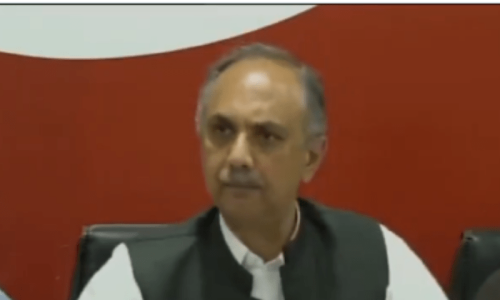WASHINGTON, Nov 25: The executive board of the International Monetary Fund has approved a $7.6 billion loan for Pakistan under a programme that also requires Islamabad to reduce its fiscal deficit to 3.3 per cent of the GDP and bring down inflation to six per cent.
“By providing large financial support to Pakistan, the IMF is sending a strong signal to the donor community about the country’s improved macroeconomic prospects,” said IMF Deputy Managing Director Takatoshi Kato. The programme was approved at a board meeting at the IMF headquarters in Washington on Monday.
“The programme aims to restore the confidence of domestic and foreign investors with a tightening of fiscal and monetary policies, while maintaining social stability through targeted spending,” the IMF said.
Hours after the approval, IMF’s mission chief to Pakistan, Juan Carlos Di Tata, told a news briefing on Tuesday that most of the adjustments for reducing fiscal deficit would come from eliminating fuel and electricity subsidies and from eliminating exemptions on income and agriculture taxes.
The government has already withdrawn fuel subsidies, while its efforts to increase electricity rates caused widespread protests this summer. Any measure that leads to an increase in fuel prices or electricity rates is bound to cause more violent reactions and may further reduce the already depleting popularity of the current government.
But the IMF assured the people of Pakistan that “expenditure on the social safety net will be increased to protect the poor through both cash transfers and targeted electricity subsidies”.
While many in Pakistan questioned the government’s wisdom in going to the IMF, the Fund’s mission chief for the country warned that Pakistan was not out of the woods yet. He said the country needed as much as $13 billion during the current financial year to stabilise its economy.
Mr Di Tata spelled out some of the conditions attached to the loan, but said the IMF had not asked Pakistan to reduce defence spending because it was for the government to determine how it wanted to bring down its expenditure.
He said that out of the $7.6 billion pledged on Monday, Pakistan would get a total of $4.7 billion during the current fiscal year. The rest will be disbursed after quarterly reviews during the next 23 months.
“The regular monitoring of the economy … will show how the macroeconomic objectives set by the government are being met and whether they need to be adjusted in the light of changing circumstances,” the IMF said.
Besides the IMF, the World Bank and the Islamic Development Bank will also give $3.8 billion to Pakistan during the current fiscal year, while $4.5 billion will come from the Friends of Pakistan club and other donors.
Earlier, the IMF issued a statement saying that Pakistan would get immediate access to $3.1 billion from the $7.6 billion pledged and this amount may be deposited into Pakistan’s account at the US Federal Reserve in New York as early as Thursday.
The IMF expects Pakistan’s economic growth to slow to 3.4 per cent in the current fiscal year from 5.8 per cent the previous year. It is forecast to recover to five per cent next fiscal year.
The Fund expects the country’s budget deficit to be reduced to 4.2 per cent of gross domestic product in the current fiscal year and 3.3 per cent the following year -- from 7.4 per cent at the end of June.
“The reduction will be achieved primarily by phasing out energy subsidies, better-prioritising development spending and implementing tax policy and tax administration reforms,” Mr Kato said.
The State Bank of Pakistan, which recently conducted a two-percentage point hike in the discount rate, is expected to bring down inflation and shore up reserves, the IMF said. The central bank is also expected to stop financing the government.
The programme includes measures to improve monetary management and enhance the SBP’s bank resolution capacity, and avoid the use of public resources to support the stock market.
Mr Di Tata noted that the reduction in expenditures would create room to increase spending on the social safety net.
The fiscal programme for 2008-09 envisaged an increase in spending on the social safety net of 0.6 percentage points of GDP to 0.9 per cent of GDP, the
IMF said.
















































Dear visitor, the comments section is undergoing an overhaul and will return soon.